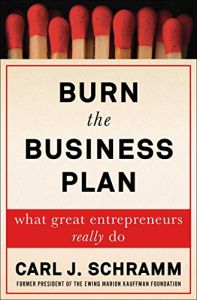Join getAbstract to access the summary!

Join getAbstract to access the summary!
Carl J. Schramm
Burn the Business Plan
What Great Entrepreneurs Really Do
Simon & Schuster, 2018
What's inside?
Entrepreneurial success requires a “leap of faith” – not a business plan.
Recommendation
Economist, entrepreneur, professor, venture investor and the former head of “the world’s largest philanthropy dedicated to promoting entrepreneurship,” Carl J. Schramm reports that many popular ideas about how to launch a business are built on unrealistic ideas of what makes companies work. This refreshing guide presents case studies to show how various factors affect specific businesses and their founders. getAbstract recommends this inspiring evaluation of entrepreneurship to business creators at all stages of their companies’ growth, as well as to prospective franchisees, entrepreneurship teachers and those looking to build a business.
Summary
About the Author
Economist and professor Carl J. Schramm has founded or co-founded five companies, co-founded the Global Entrepreneurship Week, and served on the President’s National Advisory Council on Innovation and Entrepreneurship.




















Comment on this summary